The Unknown War: Hot Summer of 1918

Still from the film “The Sixth of July” (1968). Units of the Latvian riflemen enter Moscow at 5:10 am on July 7 to suppress the Left Socialist Revolutionary rebellion
We walked with Budyonny
Lynx to big things.
In the humpback mounds,
On river rifts
Our loud glory has passed.
A. A. Surkov "Cavalry Song"
Unknown Wars. The summer of 1918 was truly hot. Soviet Russia found itself surrounded by fronts, and even inside the “besieged fortress” not everything was in order.
The peasants divided the land, and... the middle peasants no longer needed anything. The poor turned out to be dependent on the state for everything, and the kulaks were forbidden to cultivate the land with hired labor, and why did they love the new government? The Left Social Revolutionaries were dissatisfied with the Brest-Litovsk Treaty. The anarchists were dissatisfied with everything in general. Krasnov’s Cossacks operated in the south, Germans and Austrians in the west, and rebel Czechs and the Komuch army in the east.
In a word, the situation was very difficult. Today we will see what the Izvestia newspaper wrote about the events of that “hot summer”...
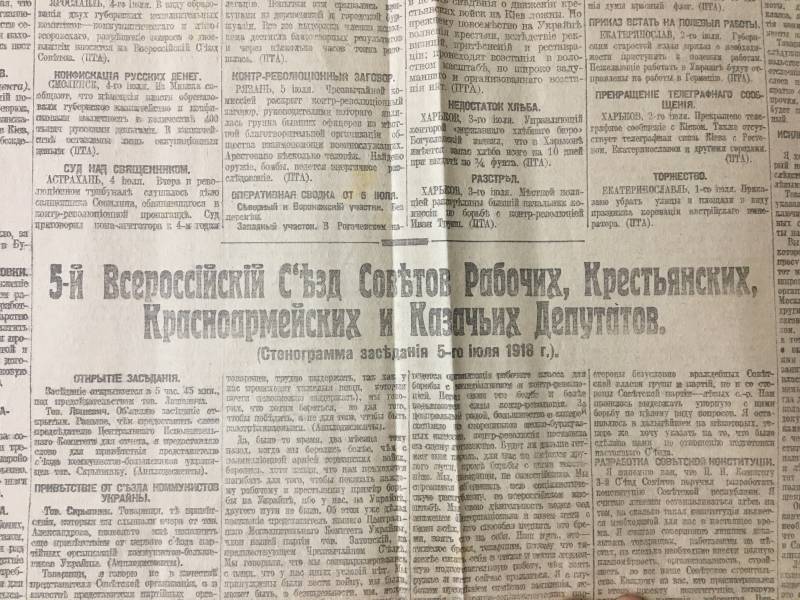
Message about the beginning of the 5th Congress
Let's start with the fact that on July 5 the All-Russian Congress of Soviets began. The delegates greeted the appearance of V.I. Lenin with an ovation!
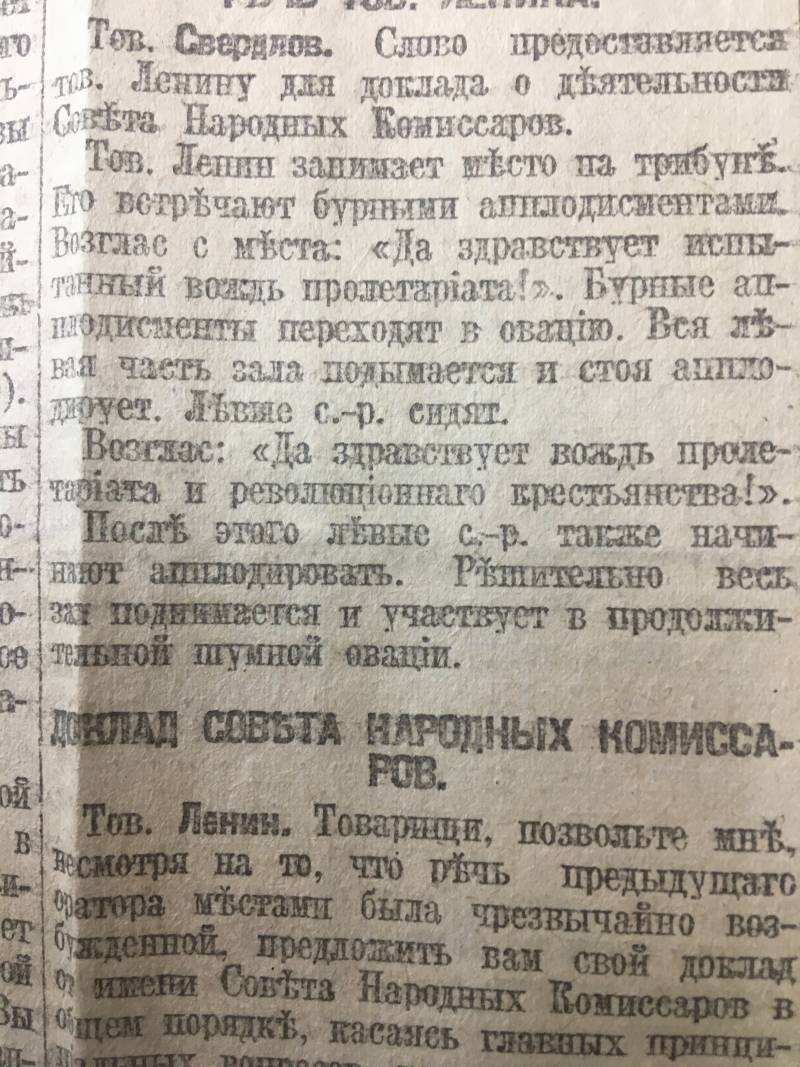
Lenin on the podium. Everyone stands up and clap. And the Left Socialist-Revolutionaries are sitting...
Opinions at the congress were expressed very sharply. But... there was freedom of expression. After all, they were expressed by revolutionaries known throughout the country, who went through both tsarist prisons and hard labor. Moreover, on July 5, the Left Socialist Revolutionary faction (352 people) at the congress expressed no confidence in the Soviet government.
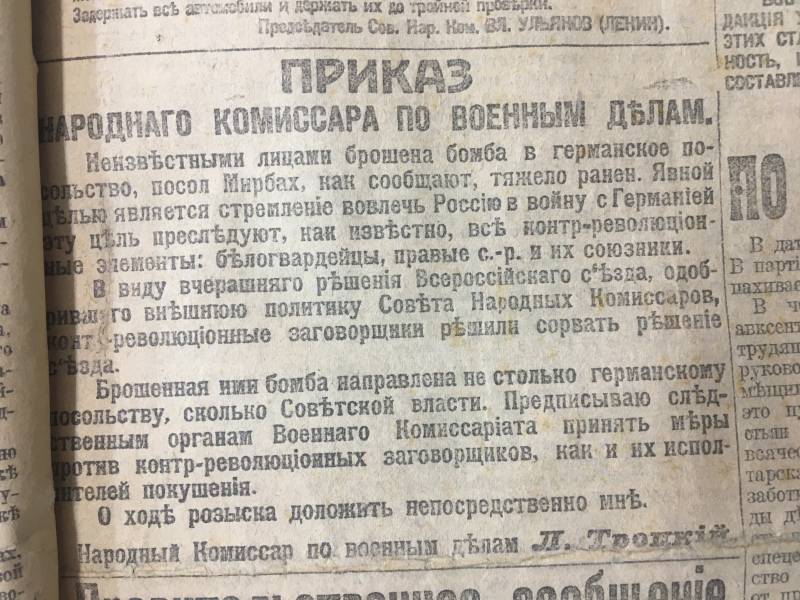
Report of an assassination attempt on the German ambassador Count Mirbach
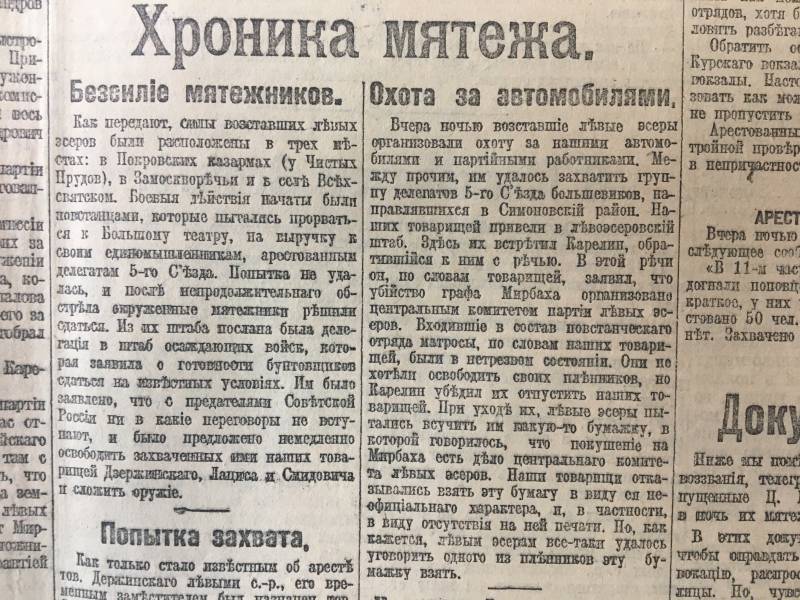
Chronicle of the rebellion
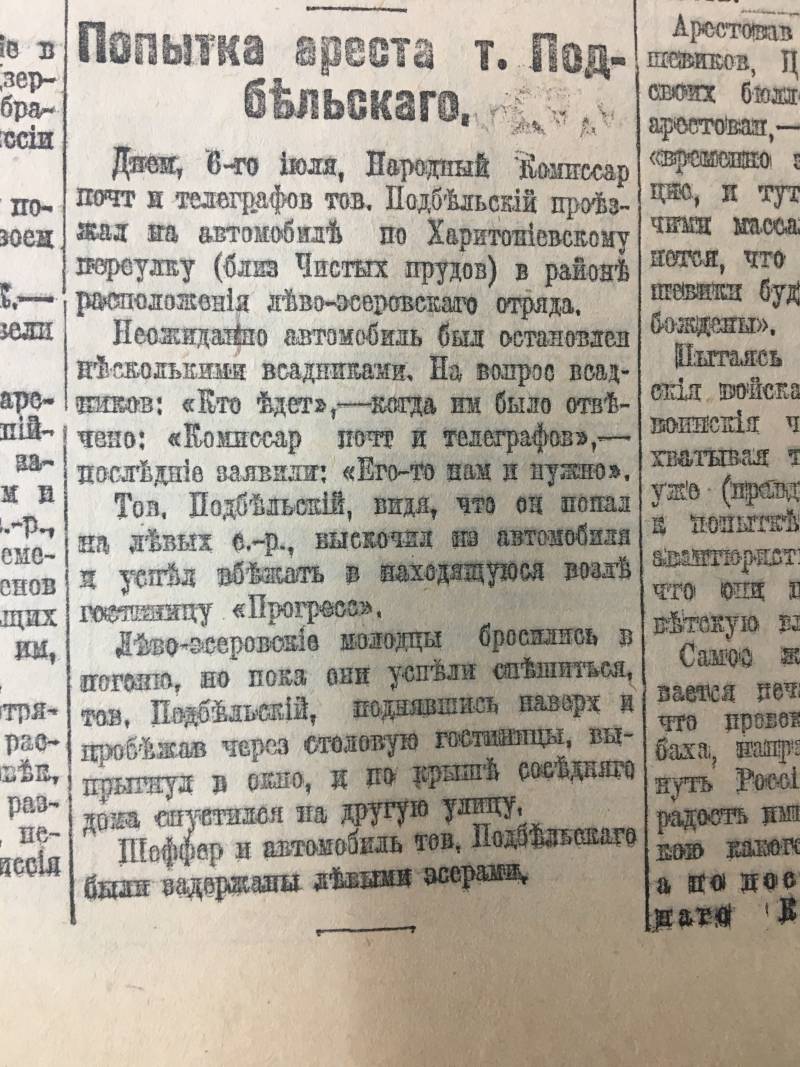
The attempt to arrest Podbelsky failed...
In general, as is clear from reports in Izvestia, the performance of the Left Socialist Revolutionaries was poorly organized. That is, they came out, and they chose the time wisely (the Latvian riflemen were celebrating St. John's Day at that time, and they were not in Moscow). But then the whole thing stalled.
They shot at the Kremlin, but did not even bother to arrest the Soviet government located in it. And at the very first artillery salvoes, the batteries of the Latvian E.P. Berzin at the headquarters of D.I. Popov’s detachment began to scatter in all directions. They did not expect that the Bolshevik artillery would hit their own people, since there were arrested Bolsheviks at their headquarters.
But the Bolsheviks were not afraid of this opportunity and achieved their goal. Trotsky, however, later stated at the V Congress of Soviets that artillery fired at the headquarters of Popov’s detachment “with exceptional accuracy.”
In addition, 450 delegates of the congress were immediately arrested, and some active participants in the rebellion, among whom was the deputy chairman of the Cheka V. Aleksandrovich, and 12 more Cheka employees from Popov’s detachment, were shot by decision of the Cheka the very next day, July 8.
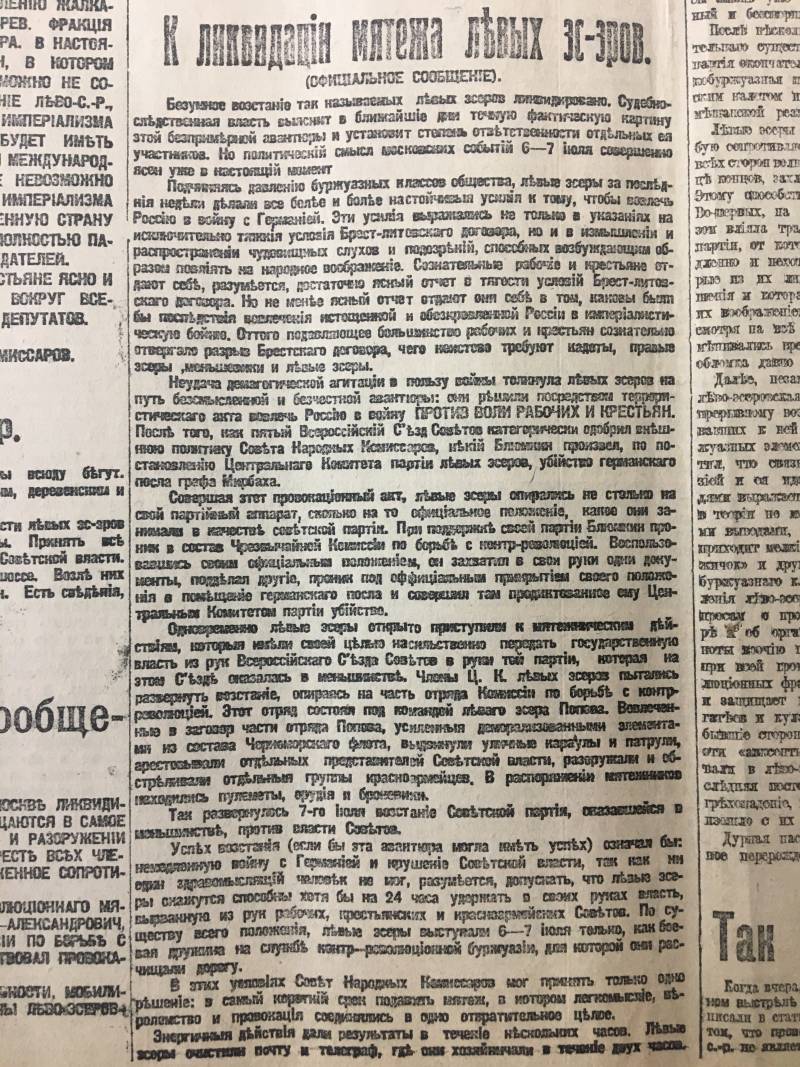
Liquidation of the rebellion of the Left Socialist Revolutionaries
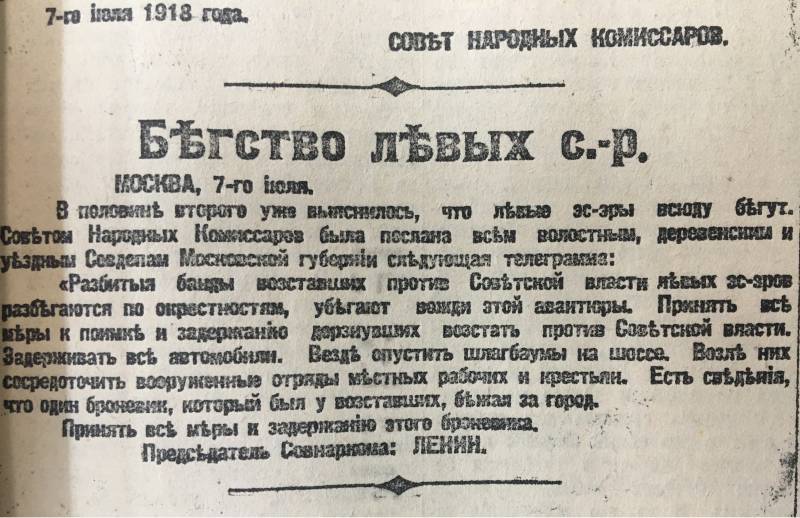
Attempts to escape...
However, in general, the left Socialist Revolutionaries were punished unexpectedly mildly: their leader Maria Spiridonova was sentenced to a year in prison, and in April 1919, her comrades kidnapped her from prison.
The main persons involved in the liquidation of Mirbach, Blyumkin and Andreev, were able to escape to Ukraine and were sentenced to only three years in prison (in absentia). Andreev soon died in Ukraine from typhus, but Yakov Blyumkin (there was a long article about him and his more than interesting fate at VO) “repented” in May 1919 and was again accepted into the ranks of the Communist Party. And then he even served as Trotsky’s guard, and he was not at all afraid that he was being guarded by a former Socialist Revolutionary.
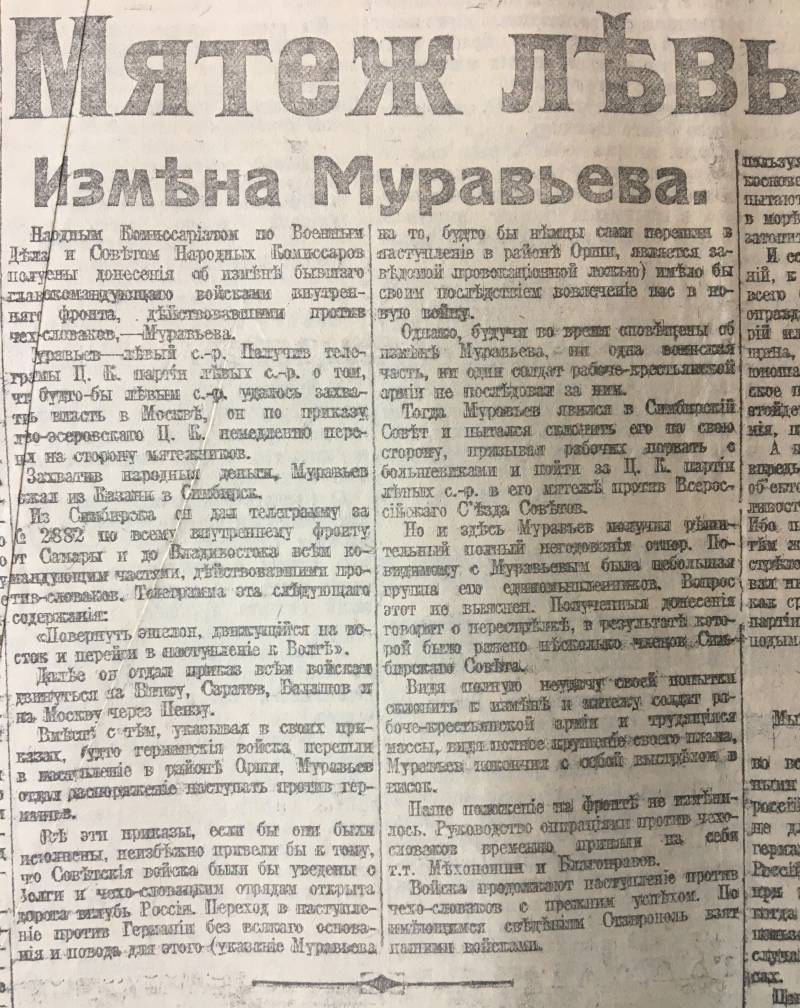
Socialist Revolutionary riots swept across the country!
Another rebellion on July 10–11, already in Simbirsk, was raised by the commander of the Eastern Front of the Red Army, the left Socialist Revolutionary M.A. Muravyov.
He stated that “defending the power of the Soviets, on behalf of the armies of the Eastern Front, I tear up the shame of the Brest-Litovsk Peace Treaty and declare war on Germany... all my friends and former associates of our glorious campaigns... I call under my banners for the bloody final struggle with the vanguard of world imperialism - Germans. Down with the shameful Treaty of Brest-Litovsk! Long live the general uprising!” It is clear that few people supported such slogans.
But the appeal of Lenin and Trotsky made an impression: “The former commander-in-chief on the Czechoslovak front, the left Socialist Revolutionary Muravyov, is declared a traitor and an enemy of the people. Every honest citizen is obliged to shoot him on the spot.”
“Shoot on sight”! Cool, needless to say! As a result, Muravyov did not wait for someone to shoot him, and wisely shot himself.
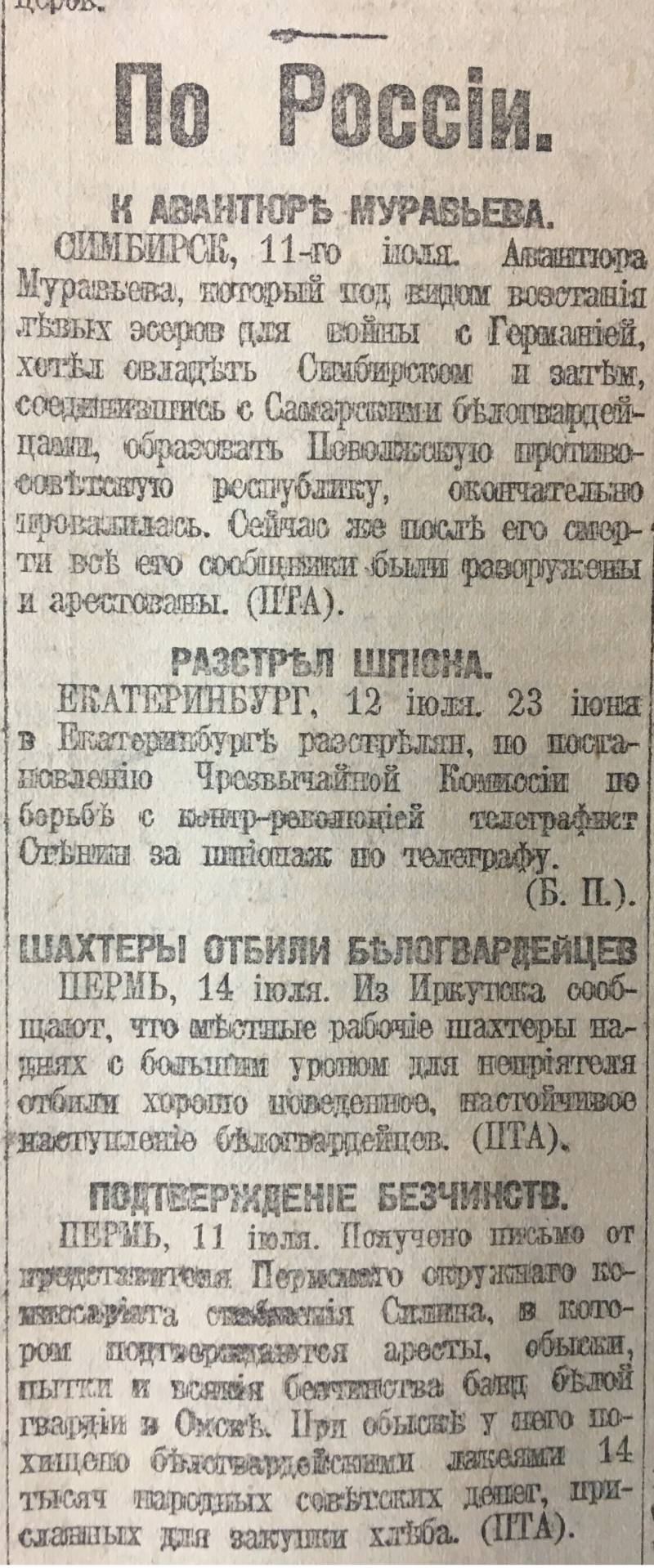
But Muravyov’s adventure began so quickly and ended so quickly!
However, the one who directly suppressed the rebellion of the left Socialist Revolutionaries in Moscow, I. I. Vatsetis, was not too lucky. He disliked Trotsky and in 1935 declared that the whole rebellion was just a “staged” version of him. But even this “exposure” of Vatsetis did not prolong his life. In November 1937, he was arrested on charges of participation in the “Latvian fascist espionage and terrorist organization in the Red Army,” which was preparing a “counter-revolutionary coup.” In July 1938 he was shot. So, even after 20 years, the bullet still found him.
However, Izvestia also published many other materials, from which an exceptionally difficult situation emerges for the country in all respects.
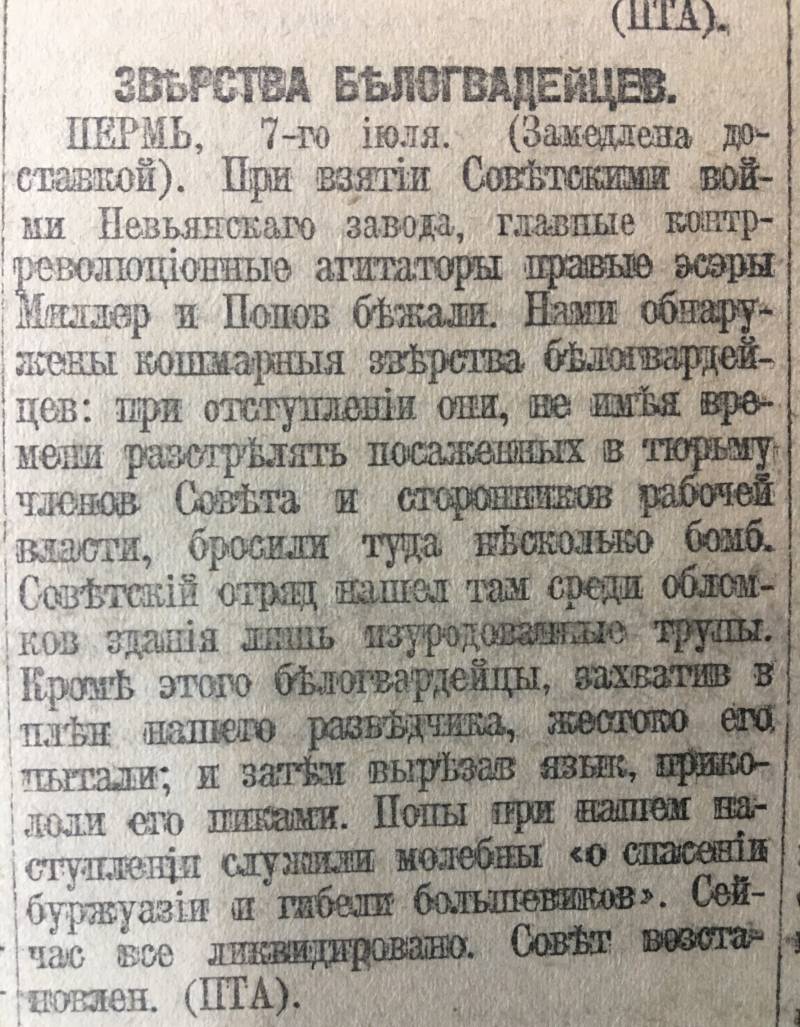
Materials about white atrocities continued to be published...
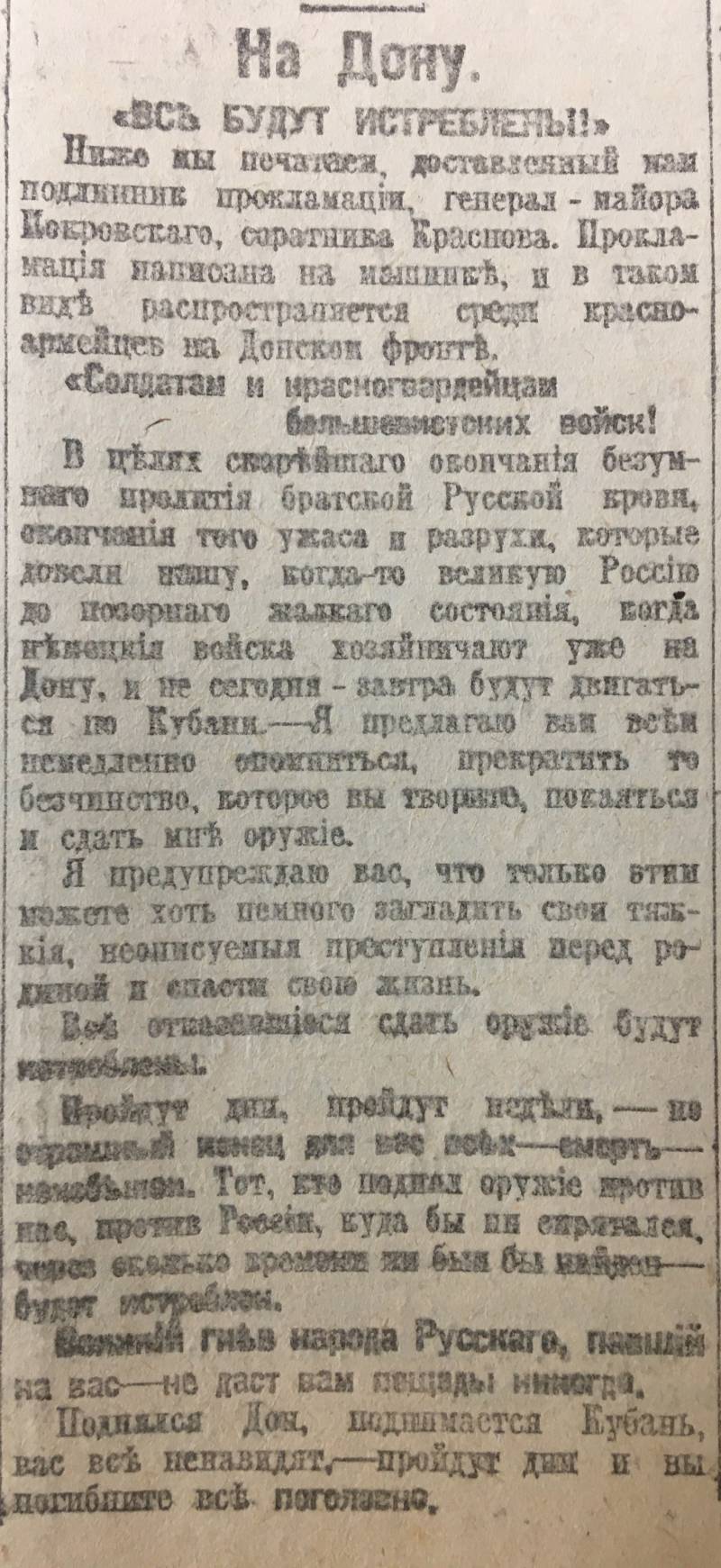
White threats against the Reds were also published...
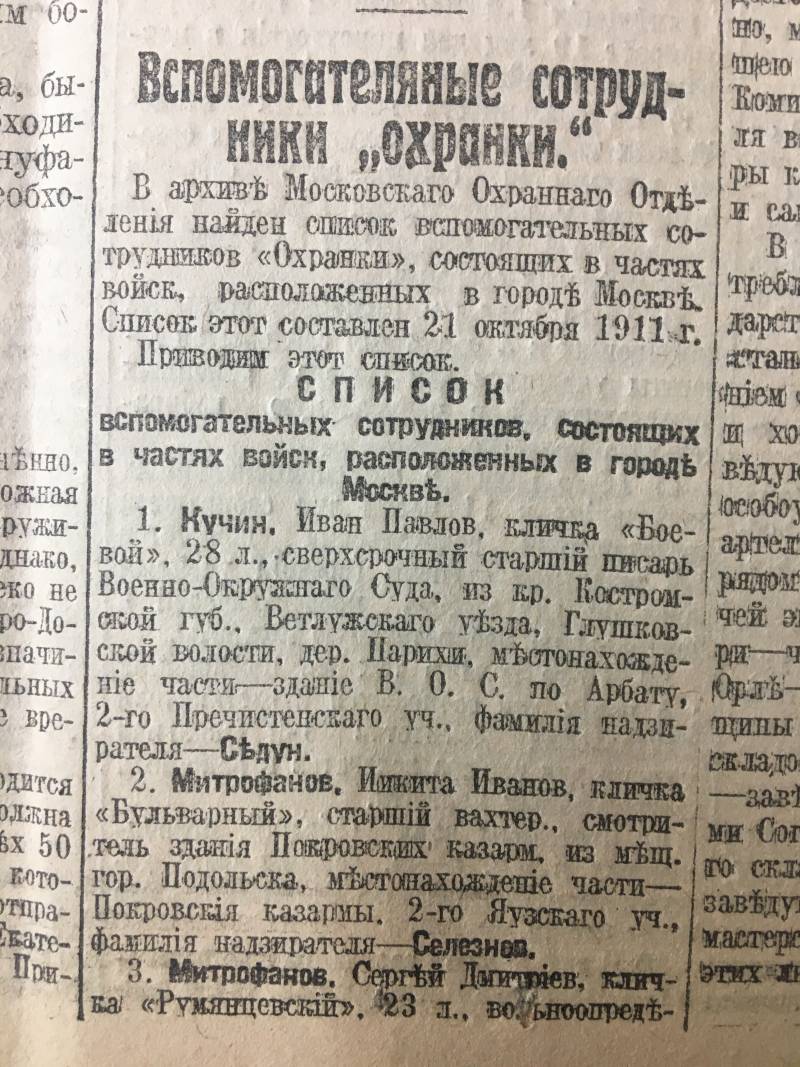
There were also very interesting reports about uncovered agents of the Tsarist secret police, who under no circumstances should have been hired by Soviet institutions!
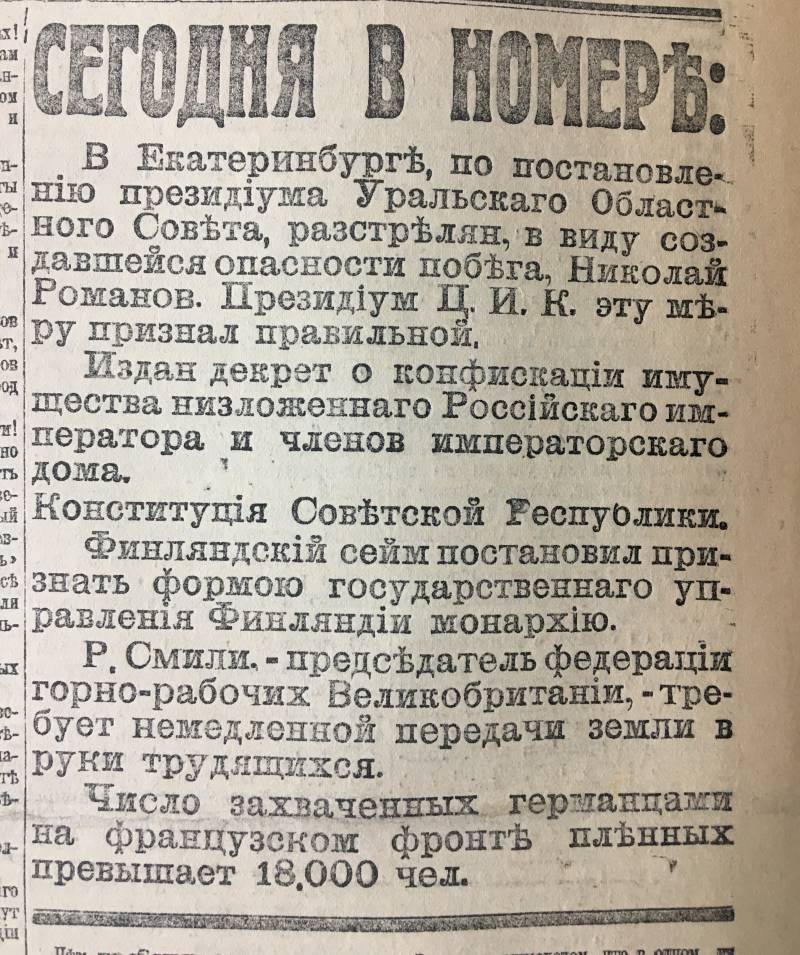
I finally had to report the execution of Tsar Nicholas...
It is interesting that immediately after this message, Izvestia began to print excerpts from the diaries of Nicholas II, from the reading of which it became clear what a non-state and narrow-minded person he was. Of course, not all diaries were published, but only selected passages. But we clearly managed to get the impression that our tsar was a “dummy.”
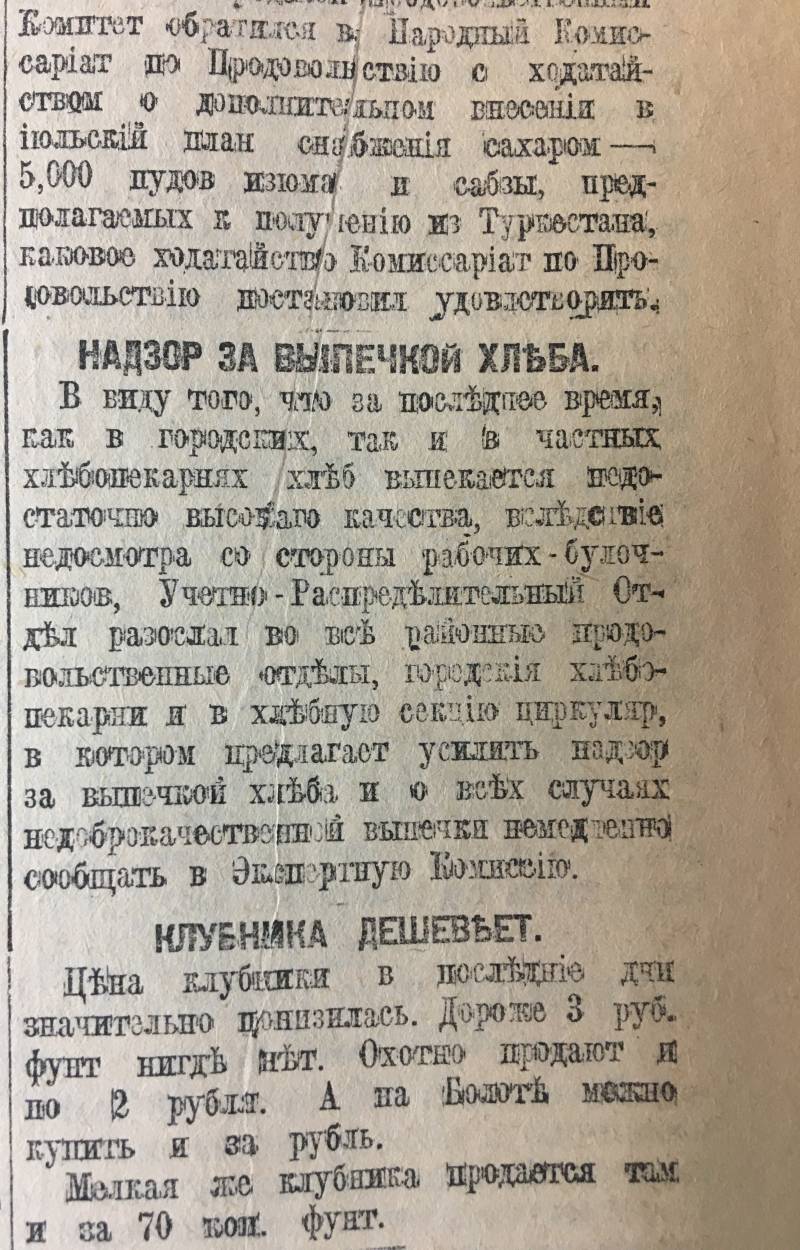
There were very big problems with food... True, strawberries fell in price in the summer!
And at the same time, the notorious Spanish flu began its victorious march across the planet. The civilized world has never encountered such a pandemic since the medieval “Black Death”!
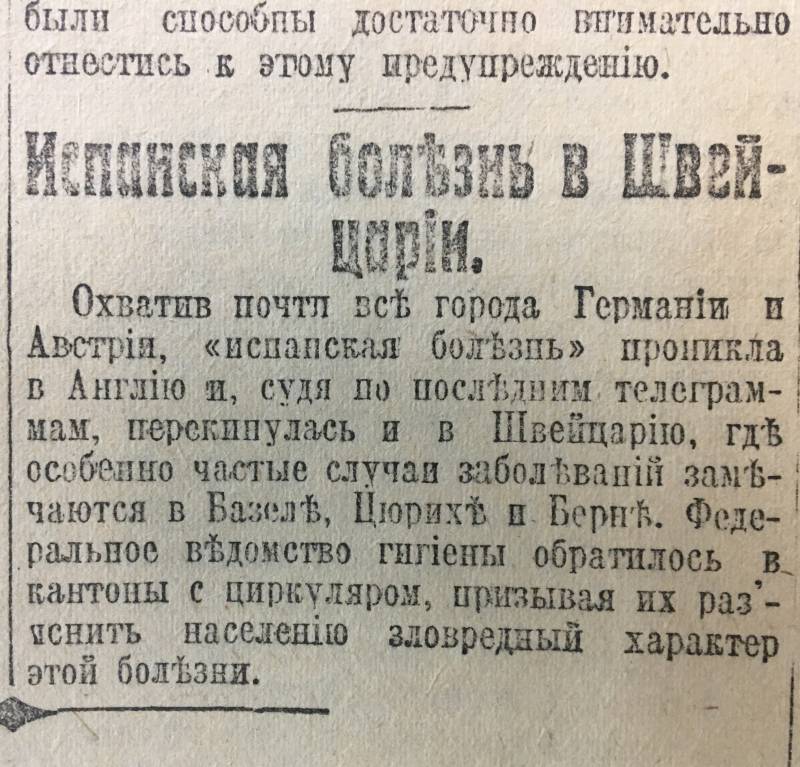
"Spanish Flu" in Switzerland
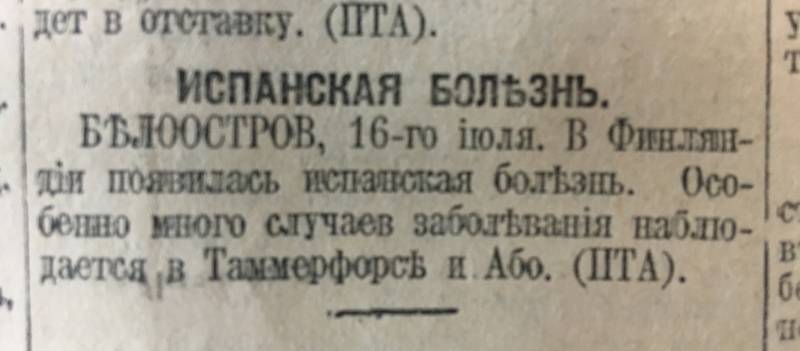
"Spanish Flu" in Finland
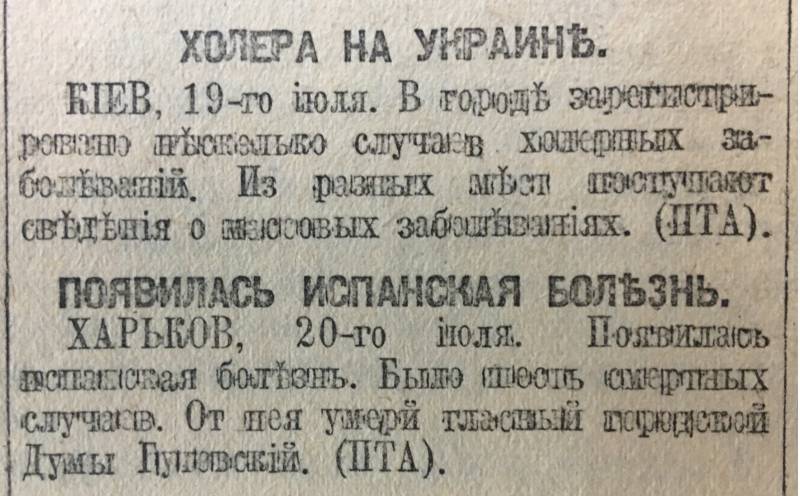
"Spanish flu" and cholera in Ukraine
The Spanish flu had not yet begun to rage at this time, but the pandemic had already started. The autumn and winter of 1918 were especially difficult. At that time, the entire English fleet in Scapa Flow was sick, and the German fleet, interned there, looked no better. That is, it is clear that it is not the fleet, but its sailors. There was a continuous cough in the cockpits... On some ships there were no healthy people left at all!
By the way, an interesting topic for further research. But you need to read special literature, and you can’t write something like that in one fell swoop.
Well, about how the disease spread among us. This is also interesting. But this concerns stories epidemiology.
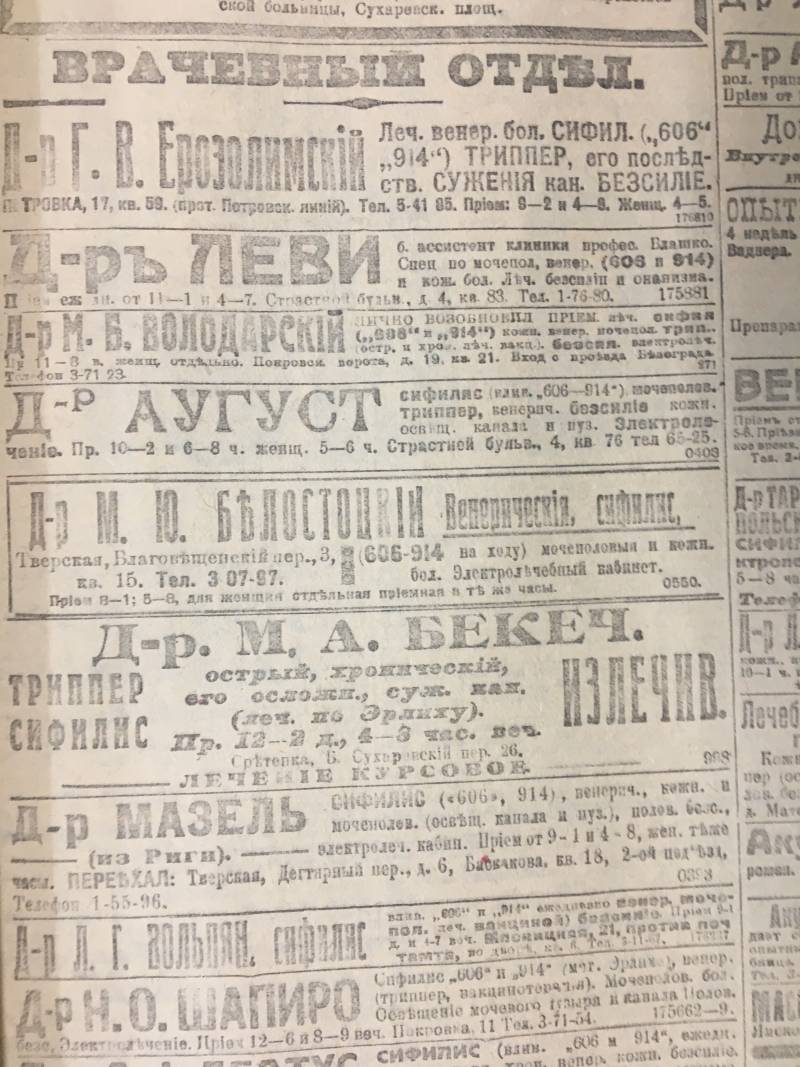
And yet... syphilis has become a completely widespread disease, advertisements for the treatment of which literally filled the relevant sections of the newspaper!
Moreover, it is interesting that they served in the army with syphilis at that time. I had to read about some kind of equestrian unit, which was called “Equestrian detachment of syphilitics”, but I couldn’t remember who had it - the whites or the reds.
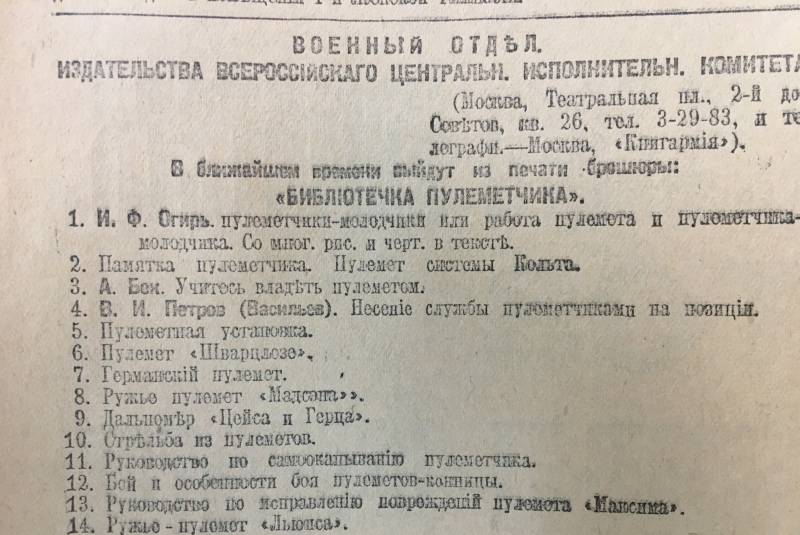
There were also advertisements like this. It’s a shame that I never came across a single brochure like this. Apparently, the paper was very bad, and they all simply crumbled over time!
And ahead were autumn and winter. When firewood also began to be required, but bread, as before, remained a very serious problem. However, we will get acquainted with the newspaper materials of Izvestia, published in the fall of 1918, next time.
To be continued ...
Information